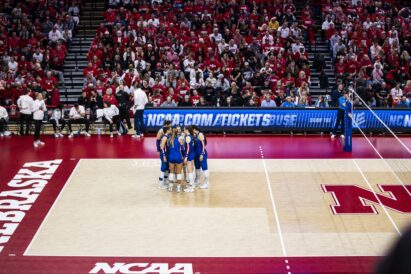Sports
Assembly Briefs



More Chilkoot Tour Permits
The assembly approved two more tour permits for operations in the Chilkoot Lake area
The applications, from Cyclops Cycles and Sue Rakes Photography, come during renewed scrutiny on overcrowding and tourist behavior in the bear-heavy area.
Rakes, and Cyclops owners Andrew and Natassja Letchworth, both submitted applications cognizant of this controversy, emphasizing limited operations and including backup plans were the assembly to not approve operations inside park boundaries.
Cyclops faced challenges in its first year of operations last year, with police saying its e-bikes and mopeds were too slow for safe operation on the highway. This year, the couple has asked for several modifications to their existing permit which the assembly ultimately split into five parts to discuss.
The application comes with a partial recommendation from the Tourism Advisory Board, which has endorsed Cyclops tours’ request to travel to the bridge area outside of the Chilkoot corridor.
During that meeting, tourism director Rebecca Hylton said that her approval was based on a belief that tourists behave better in the Chilkoot corridor when on a guided tour than they do independently.
“We can’t stop people from going out there,” said Hylton, “so the more people that are guided the better.”
Part of that TAB discussion was about support from new park ranger Jacques Turcotte in managing tourist-bear interactions, with TAB member Lori Smith saying she supported the permit, but “only because… this year we have a full-time park ranger who’s going to be out there every day.”
Turcotte later said during an assembly meeting public comment that “it is inaccurate he will be at Chilkoot 24/7,” saying that he has “over 60k acres to patrol.” Turcotte added that the bridge “passes over the park,” and activities around the bridge “actively affect things inside the park.”
Smith also said she, like tourists, stops on the bridge to look at bears. Turcotte noted that according to state law, no one is allowed to stop or stand on that bridge.
In the face of this pushback, the Letchworths, in their application, call the Lutak permit “the difference between our business failing or thriving.”
Letchworth sought, and received permits to:
—Take tours of people on e-bikes or mopeds to Lutak Road ending at the bridge; that tour has a maximum of 330 people a year.
—Take people to Viking Cove for glass-blowing classes with an annual capacity of 250. This permit is contingent upon the company getting a conditional use permit as well.
— Expand the Drinks of Haines tour to include a driving tour with an annual limit of less than 500 people.
— Offer a van tour of the Haines Highway from town to the border with Canada and back with an annual limit of 500 people.
During voting on the Cyclops Cycles Chilkoot permit, Kevin Forster apologized to Letchworth for how complicated the process has been,but acknowledged that adding to the volume of traffic in the Chilkoot area without more regulation seemed like a bad idea.
“The question is, when does it end,” assembly member Kevin Forster said. “It’s clear we’ve got to fix it.”
Assembly member Gabe Thomas ultimately voted to support Letchworth’s permit expansion, but encouraged Letchworth to think about getting his guests into less congested areas.
“I’m going to let you go on this one even though last year I felt like you kind of strong-armed us into it,” he said. “I will be honest when nobody else wants to say it, but you kind of strong-armed us into it last year because you already had tours sold and you came begging for [a permit].”
Rakes’ permit application is similar, but for far smaller numbers. Rakes hopes to bring 2-3 person photography tours for a total of 70-130 customers between now and the end of the calendar year. The application includes two possible plans for the assembly to consider: one for full park access, though no Lutak tours between mid-August and mid-September “if there is already too much traffic and visitors in the park looking for bears,” according to the permit application. The other option is operation only to the bridge, and only outside of that August-September period.
There was not as much pushback on her permit request. Assembly member Loomis said he trusted Rakes to not add to the congestion in the Chilkoot corridor, but wanted to see more data about what was happening in the Chilkoot River area.
Rakes got her permit approved as well on a 5-1 vote, with Loomis as the lone dissenter.
The assembly also referred the issue of traffic in the Chilkoot corridor to the Tourism Advisory Board and its Government Affairs and Services Committee – though Morphet noted that there has been a Chilkoot corridor plan since the late 1990s and said the borough is somewhat hamstrung in this situation.
“They’re not our bears, it’s not our river and it’s not our road,” he said.
Accessory Dwelling Units
The assembly also considered introducing a measure from the planning commission that could allow people to add apartments or small residential homes known as accessory dwelling units to their property.
It’s being pitched as a possible solution to Haines’ housing shortage. The idea behind the measure is increased flexibility, with individual homeowners able to add to the housing stock on their own property without taking on large construction projects.
That doesn’t mean just anything can go up: under this proposal, to qualify for a permit, a structure must have bath and kitchen facilities and must be either below 1,000 square feet, or 70 percent of the gross floor area of the principal dwelling on the lot – whichever is less. An accessory dwelling unit, which may be attached or unattached to existing housing on the lot, will be included in square footage calculations for maximum lot coverage regulations.
The idea was to introduce it and set up two public hearings, but Forster asked – and the assembly agreed – to delay and bring it up at its next meeting for introduction again.
A settlement with Southeast Road Builders
The borough has officially entered a settlement in a lawsuit with Southeast Roadbuilders regarding permitting for a gravel pit on Lutak Road. That dispute had been going on for a year-and-a-half, but began to come to a close during a February assembly meeting, where the assembly again went into executive session and then came out and voted to accept the settlement deal. At the time, interim borough manager Fullerton denied a records request seeking details of the settlement, arguing that the document wouldn’t become official – and therefore public – until accepted by both parties.
That is now the case, and details have been released: the borough will issue a conditional use permit to SERB for the gravel pit, and SERB will drop its litigation in the dispute.
The settlement also contains language saying that both SERB and the borough pay their own attorneys’ fees. But there is no mention of how much it will cost the borough in the settlement documentation and when assembly member Gabe Thomas asked Fullerton for a final accounting, she said she did not know.
“I’m just kind of curious because we spent a bunch of money and then turned around and backed it out,” he said.
Assembly member Smith said the full accounting for those expenses would be discussed during the next finance committee meeting; it’s currently scheduled for May 13. The assembly voted 5-1 – Loomis was the dissenting vote – to adopt the resolution.
Portage Cove
The borough and the state have come to an agreement to reopen the Portage Cove State Recreation Site to overnight camping. The arrangement will bring a return to the old norm, where Portage Cove was long open as the lone campground in the town area. That was until late 2022, when the Alaska Division of Parks prohibited overnight camping, citing costs, litter, and bear attractants.
In order to get it reopened, the borough has agreed to pitch in, described in Fullerton’s manager’s report as a “financial contribution by the Borough with respect to preparing secure areas for fire-pits, fixing picnic tables, etc.”
Even though reopening is a done deal, residents and visitors will have to wait just a little longer until preparatory work is completed. Fullerton wrote that she hoped that would be by Beerfest on Memorial Day weekend.
Beerfest, Freeride World Tour and the state of tourism
As for Beerfest, Fullerton reported that only around 75% of available tickets have been sold. That number has been cited in recent weeks as a bellwether for Canadian tourism, and 75% is well below expectations. Before tickets went on sale on March 1, tourism director Rebecca Hylton said that if tickets did not sell out “in the first couple of days,” she would know a big drop in Canadian tourism was real.
As expectations for tourism this summer continue to be dampened by U.S.-Canada conflict, Hylton’s office continues to explore other options. One of the possibilities for the upcoming year is to bring the Freeride World Tour to town.
The borough appropriated $75,000 for sponsorship in the current year’s budget, but that money was unspent. “I think one of the reasons it didn’t work for this year, 2025, is that we had to act too late. By the time it was funded, the sponsorship was already due,” Fullerton said.
In her proposed budget for next year, Fullerton earmarked that money for the same thing, saying in her report that the assembly will have to decide to approve that specific line item by April 11, when the proposal to the World Tour is due.
The borough would be proposing sponsorship for one year, with the option to renew for an additional two or three years. Hylton estimates that bringing the tour to town would generate $416,000 locally.
Hylton told the assembly that Freeride wanted to make the announcement over the weekend, particularly if they’re coming back to Alaska.
She said she was not in support of the sponsorship last year, but has since changed her mind.
“I had a hard time swallowing that we should be paying for people to hold an event here, because we do have a lot of value. But, as you … hopefully are all aware things are different now, especially in tourism,” she said. “I think we’re going to need every little help that we can get to draw the attention on our community.”
She said the sponsorship ask is now $100,000 and there is a possibility for in-kind contributions for some of it. “My compromise is that, should you agree to do this, you agree to say yes to the $75,000 and then I could work with freeride for the other $25,000. I do believe there is some wiggle room there with that,” she said.
Hylton said the exposure of something like Freeride is priceless, as the heli-skiing industry is growing.
“The demographic of the amount of money that they have and their ability to travel to places on whims with exposure that we have – it’s a beautiful thing,” Hylton said. “The asset that we have in those mountains really is world class.”
Assembly member Mark Smith jumped in to say that he was in support of the sponsorship and is fine shelling out an additional $25,000. He suggested taking it from the Haines Economic Development Corporation.
“I’m really not that much interested in money right now, but a commitment by this borough and this assembly to take the chastity belt off that mountain range over there, move it south and let them start skiing,” Smith said.
Loomis agreed with Smith saying “we need a playground.”
At the beginning of the meeting Zach Wentzel, speaking on behalf of the Chilkoot Indian Association’s economic development team, and specifically its new cultural tourism enterprise Discover Deishú, said he supported the assembly re-allocating $75,000 in support of bringing the tour to Haines.
“The Freeride World Tour represents an expression of one of the greatest assets we have here in Haines, which is one of the most spectacularly mountain environments in the world,” he said.
Wentzel said free riding could be an Olympic sport soon, and if that happens there will be funds for local and regional ski clubs.
“It would be a big thing for the community. It would be a big thing for the tribe. It would be a big thing for our cultural tourism endeavors and initiatives, and an opportunity for collaboration … across two local governments here and something we can build on,” Wentzel said. “We need something as a community and this could be a real good thing.
The assembly unanimously agreed to reaffirm its support for the tour.
Mosquito Lake School
Assembly member Smith put forward a proposal to refer the borough-owned property at Mosquito Lake School to the planning commission to be split and potentially sold.
The Mosquito Lake School has been out of commission as a school since 2014 when student enrollment dropped below the threshold for operation. The building was repurposed in the wake of that closure as a multi-use community center, which has been in operation since 2016.
Under the current arrangement, the borough owns the building and pays big-ticket items like utilities, maintenance projects, and insurance. Four Winds Resource Center is responsible for day-to-day management. Last year, operating the community center cost the borough $37,736.
“I know this appears draconian,” Smith said. “It is not.”
He said his goal was to divest the borough of a municipal entitlement and said that longterm, those types of borough-owned properties could be costly to maintain, particularly when they need large repairs. He went on to say that facilities like the school are a “constant drain” on the community and said he represented a silent majority of people in the Chilkat Valley.
“All I’m trying to get to is a position to make a deal,” he said. Smith said an upper valley community member – Jim Stanford – had pointed to the current operating costs as a “drop in the bucket” of the borough’s overall budget.
“Well if it’s a drop in the bucket for us, it can be a drop in the bucket for them,” Smith said.
Once the planning commission takes it up – Smith said the conversation could include a range of options including giving the Four Winds Resource Center the right of first refusal to buy the property, which could be sold at or below market rate. Or the school could be sold to the public.
“My gut tells me, give them the first shot,” Smith said. “They’ve done a beautiful job at running that operation.”
Assembly member Loomis tried twice to delay the vote, first at the beginning of the meeting asking that it be removed from the agenda and second by asking that the assembly go as a body and talk to people in Mosquito Lake in person before making a decision. Both of those efforts failed and ultimately the assembly voted to forward Smith’s measure to the planning commission.
Police chief hire
The borough is again narrowing in on a potential new police chief. This time it’s police officer Jimmy Yoakum of Loudon County, Tennessee.
The Public Safety Advisory Board recommended Yoakum, and Denker said the borough’s consultant, Greg Russell, is in the process of doing background and reference checks.
“As of yesterday afternoon, he was 80% completed with the background checks,” Denker said.
Haines’ former police chief Josh Dryden left in November of 2024, and officer Michael Fullerton has been working as interim chief since then. It was a situation made more complicated by his wife’s role as interim manager, who generally oversees the police chief.
Initially, Fullerton considered applying for the position after meeting with other finalists. Then one finalist withdrew from consideration after visiting Haines, specifically citing his negative interactions with Fullerton and how complicated he believed it would be to supervise one person while reporting to their spouse.
Fullerton announced last week that he’d be resigning at the end of April.
The assembly voted to invite Yoakum and his partner to Haines to see if they would be a good fit for the community.
Sports
Nebraska volleyball sweeps Kansas, advances to Elite Eight
Sports
Maine wraps up Fall Semester with a win in Black Bear Invitational

ORONO, Maine – The University of Maine track and field program hosted their Black Bear Invitational meet on Friday December 12. The Black Bears hosted the University of Maine at Fort Kent Bengals and the Husson University Eagles at the New Balance Indoor Track. The Black Bears took home 1st place with a score of 97 points.
Cheyenne Figueroa continued her strong start to the season with another 1st place finish in the weight throw event with a final distance of 16.93m (55′ 7″). Ava Zollars took home second place overall finish with a distance of 13.96m (45′ 10″). Sabine SItes rounded out the top three with a final distance of 13.06m (42′ 10″).
Julia Bassi took home 1st place in the shot put with a distance of 11.86m (38′ 11″). Cheyenne Figueroa finished 2nd overall with a final distance of 11.83m (38′ 9.75″). Riley Gavigan finished with a top 5 performance, finishing 5th with a distance of 9.19m (30′ 1.75″).
Athena Cusson got the Black Bears to the top of the leader board again with a 5.58m (18′ 3.75″) jump in the Long Jump event. Saphryn Humason took home a second place overall finish with a distance of 5.41m (17′ 9″). Martha Baharova rounded out Maine’s top 3 finishers, finishing 4th overall with a distance of 5.02m (16′ 5.75″).
Lydia White was the only Black Bear to compete in the Pole Vault event. White took home a first place overall finish with a height of 3.00m (9′ 10″).
Saphryn Humason took home 1st place in the Triple Jump with a distance of 10.87m (35′ 8″), competing as the lone Black Bear in the event.
The Black Bears swept the competition in the Mile run as Megan Randall came out of the gates flying, finishing in 1st place with a time of 5:02.71. Ryan O’Connor took home a 2nd place overall finish with a time of 5:06.48. Lauren Hamilton rounded out the top three with a time of 5:08.41.
In the 600m, Addison Nelson took home a 1st place finish with a final time of 1:40.83. Searcy Mooney took home 2nd place with a final time of 1:42.51. Toni Vaillancourt wrapped up the top 3 with a time of 1:43.15.
Athena Cusson took home a 1st place finish in the 60m Hurdles as the only Black Bear to compete. Cusson finished with a final time of 10.47.
The Black Bears would once again take all three spots of the top 3 in the 60m Dash. Bayleigh Shanahan would take first place with a sub-8 second finish, finishing at 7.97. Catherine Primavera would finish with a time of 8.12, finishing in 2nd place. Maddie Chaput would round out the top three with a final time of 8.20.
Ruby Krasnow would run away with the 3000m Run with a final time of 9:58.32, finishing in 1st place. Freshman Kara Tschida and Natalie Johnson would round out the top three for the Black Bears. Tschida finished with a time of 10:29.42, while Johnson finished with a time of 10:47.70.
Maddie Cyr would finish with a time of 42.72 to capture a first place finish in the 300m Dash. Cassidy Novicka would take home a second place finish, finishing with a time of 43.16. Catherine Primavera, with a time of 43.25 would finish in 3rd place rounding out the top 3.
Meredith Walters would finish in 1st place with a time of 3:02.34 in the 1000m Run. Abby Rodriquenz would finish in 2nd place with a final time of 3:02.78. Emma Tessier would round out the top 3 with a final time of 3:09.71.
In the 4000m Distance Medley Relay, the group of Ryan O’Connor, Addison Nelson, Megan Randall and Ruby Krasnow would dominate the field finishing in 1st place with a time of 12:33.45. Natalie Johnson, Bri Harriman, Searcy Mooney and Kennedy Taylor would finish in 2nd place with a time of 12:49.99. Kara Tschida, Cassidy Novicka, Amy Rein and Lauren Hamilton would round out the top three with a final time of 12:55.76.
The 4×200 Meter Relay would end the evening as the group of Maddie Chaput, Lydia White, Catherine Primavera, and Saphryn Humason would take home a first place finish with a time of 1:50.13.
The Black Bears wrapped up their fall semester and will take on the Bates College Invitational to open up the spring semester on January 17th.
-UMaine-
Sports
Historic Season Comes to Close

In one of the premier volleyball arenas in the country, the Hoosiers went blow-for-blow with the four-time national champions. IU lost by just a combined 11 points and reached the red zone (20+) in all three sets. Head coach Steve Aird‘s group recorded more kills (48-45) but couldn’t find a defensive answer for Texas’ All-American outside hitter Torrey Stafford.
Senior outside hitter Candela Alonso-Corcelles recorded 13 kills in her final game with the Hoosiers. It was the 74th time in her college tenure that she recorded a match with at least 10 kills. IU found great success in the middle with seven kills (.778) from senior middle blocker Madi Sell and eight kills (.700) from freshman middle blocker Victoria Gray.
Contributions from freshmen were felt from every part of the court. Freshman setter Teodora Krickovic dished out 38 assists while freshman outside hitter Jaidyn Jager contributed eight kills. Freshman outside hitter Charlotte Vinson had an ace and picked up her first career kill for the Hoosiers. Six of IU’s 10 players on the court were true freshmen on Friday.
In totality, IU’s 2025 team will go down as the greatest in program history. The Hoosiers broke single-season program records in the NCAA era for wins (25), regular season wins (23), Big Ten wins (14), road wins (9), ranked road wins (3). IU advanced to its second NCAA regional semifinal in school history.
How it Happened
• The defensive effort made the difference for Texas on Friday afternoon. The Longhorns racked up 10 more blocks than the Hoosiers (12.0-2.0). IU dug 38 balls but struggled to find points in transition. Texas had an answer for every IU swing in the match.
• Texas’ All-American outside hitter Torrey Stafford was virtually unstoppable on Friday. She picked up 19 kills on zero errors for a .679 hitting percentage. She dug eight balls and had a hand in four blocks as well. IU had more kills (48-46) but had 23 attacking errors.
Top Hoosier Performers
#3 Alonso-Corcelles, Candela
13 kills, 10 digs
#10 Krickovic, Teodora
38 assists, 7 digs, 2 kills
#23 Gray, Victoria
8 kills, .700 hitting percentage
Notes to Know
• Senior outside hitter Candela Alonso-Corcelles played her final career game for the Hoosiers. She provided 13 kills in the match, the 74th time that she’s had double-digit kills in a contest. She ends her career eighth in program history in kills (1,386). She’s the first IU player since Jordan Haverly (2009, 2010) with consecutive seasons of 400+ kills.
• The Hoosiers ended the 2025 season hitting .281 as a team. That is a new single-season program record, obliterating the previous IU standard (.246) from 1989. All three of IU’s pin hitters and all three middle blockers that played regular time finished with a hitting efficiency of .240 or better on the year.
• For players with at least 300 attempts in a season, freshman middle blocker Victoria Gray finished the season hitting .378 with 152 kills. That mark puts her second in a single season in program history while smashing the previous single-season freshman hitting percentage record.
• Senior opposite hitter Avry Tatum finished her IU career with a collective hitting percentage of .273 with 936 kills on more than 2,000 swings. Among all pin hitters in program history, no IU player hit at a better efficiency (min. 1,000 attempts) than Tatum did in her three seasons in Bloomington.
Sports
KU volleyball knocked out by unbeaten Nebraska in Sweet 16 sweep


Kansas Athletics
The Kansas volleyball team huddles during its match against Nebraska on Friday, Dec. 12, 2025, in Lincoln, Neb.
A promising season of Kansas volleyball under the guidance of first-year head coach Matt Ulmer came to a grim end on Friday night in Lincoln, Nebraska, as the Jayhawks found themselves on the receiving end of a dominant 3-0 sweep (25-12, 25-11, 25-12) by the host Cornhuskers at the Bob Devaney Sports Center.
KU was overmatched in all phases against No. 1 overall seed Nebraska (33-0), which has still lost just one set at home all season and hit .450 against a usually rock-solid defense. The Jayhawks did not record a block until they trailed 20-10 in the final set, while senior libero Ryan White was limited to five digs in her final collegiate match.
Middle blocker Reese Ptacek, outside hitter Rhian Swanson and opposite hitter Jovana Zelenović accounted for six kills apiece, but they came on 15, 30 and 22 attacks, respectively. Katie Dalton recorded 11 assists, and Cristin Cline had eight.
Meanwhile, Nebraska’s Rebekah Allick recorded a kill all nine times she swung. The Cornhuskers’ setter Bergen Reilly, the Big Ten’s player and setter of the year, finished with 30 assists. Middle blocker Andi Jackson equaled Allick with nine more kills.
At the service line, the Jayhawks committed six errors with one ace.
“You’re really having to nitpick to try to figure out what to do to make (Nebraska) uncomfortable and you have to just execute at a much higher level than what we were able to do,” KU coach Matt Ulmer told reporters after the match. “We tried to serve some different spots, they held out pretty good. We tried to serve aggressive, but then you can’t miss too much. I just thought we had to be much cleaner from the service line to even apply some pressure.”
The Huskers didn’t let any of the three sets remain close for long, but they certainly opened the match with a bang as they came out with a 10-1 run capped off by consecutive aces by Olivia Mauch on reception errors by Logan Bell. The Jayhawks were able to get Zelenović going a bit with three kills late in the set, but the margin never got close, thanks in large part to Allick’s performance.
KU looked briefly like it might hang around longer in the second set when a kill by Dalton cut its deficit to 9-7. But Nebraska proceeded to score the next four times, while the Jayhawks only got four points the rest of the set.
The Huskers weren’t going to slip up and lose a set at home for the first time since Sept. 12. Instead, they strung together another 7-1 run early, featuring a couple of kills by Teraya Sigler, and never looked back.
The result brought a decisive end to the Jayhawks’ season in the Sweet 16, with one of their primary goals still accomplished as they had managed to make it out of the first weekend for the first time since 2021. They concluded the campaign with a record of 24-11 and a second-place finish in the Big 12 Conference.
“For us, as not good as right now feels, it’s been a great year for us and it’s been a great season and we’ve achieved so much, so I’m really proud of them,” Ulmer said. “I know it’s hard to feel that in the moment, but big picture, it was a great year for Kansas.”
The Jayhawks will have some holes to fill with six players having gone through senior day, including key contributors Dalton, Swanson and White. However, many of their top players were underclassmen, including a trio of international freshmen.
 Kansas Athletics
Kansas AthleticsKansas pin hitter Grace Nelson makes a pass against Nebraska on Friday, Dec. 12, 2025, in Lincoln, Neb.

PREV POST
Jon Jon Kamara will transfer away from KU football
NEXT POST
KU volleyball knocked out by unbeaten Nebraska in Sweet 16 sweep

Sports
No. 1 Nebraska volleyball powers past Kansas, sets regional final date with Texas A&M


LINCOLN, Neb. (KLKN) — The No. 1-ranked Nebraska volleyball team took care of business Friday night, sweeping Kansas in the regional semifinal of the NCAA Tournament.
The Huskers won 25-12, 25-11, 25-12 at the Bob Devaney Center.
As a team, the Huskers boasted a .450% hitting percentage, compared to the Jayhawks’ .029%.
It was both middle blockers for Nebraska that paved the path to victory.
Rebekah Allick and Andi Jackson each had a team-high nine kills. Allick finished the match with a perfect 1.000% hitting percentage, and Jackson had a team-high five blocks.
Harper Murray followed close behind with seven kills and a .238% hitting percentage. She also tallied a team-high 10 digs.
Bergen Reilly led an efficient offense with 30 assists, and Olivia Mauch racked up three aces.
The Huskers will face off against Texas A&M on Sunday for a chance to go to the Final Four in Kansas City.
First serve is set for 2 p.m. on ABC.
Sports
Thirteen Student-Athletes Earn Degrees in Fall

Highlighting the 13 who graduated this fall were eight members of the K-State football team, and one each from the baseball, volleyball, rowing, soccer and women’s track and field programs.
The group of graduates was also honored Friday at the department’s annual graduation reception.
K-State continues to rank among the league’s best in terms of academic success as all programs are currently well above the required NCAA APR standard in addition to ranking among the best in the Big 12 in graduation rates – including five teams that have Big 12-leading marks this year.
2025 Fall Graduates
Baseball
Cadyn Karl, Finance
Football
JB Bradley, Integrative Human Sciences
Jet Dineen, Communications
Sam Hecht, Construction Science and Management
Damian Ilalio, Athletic Training and Rehab Sciences
Jacob Knuth, Management
Isaac Koch, Finance
Sterling Lockett, Management
Brayden Loftin, Kinesiology
Rowing
Emma Johnson (Jaelley), Elementary Education
Volleyball
Ava LeGrand, Finance
Soccer
Paige Dickson, Life Sciences
Women’s Track and Field
Brooklyn Jones, Integrative Human Sciences
-

 Rec Sports3 weeks ago
Rec Sports3 weeks agoFirst Tee Winter Registration is open
-

 Rec Sports2 weeks ago
Rec Sports2 weeks agoFargo girl, 13, dies after collapsing during school basketball game – Grand Forks Herald
-

 Motorsports3 weeks ago
Motorsports3 weeks agoCPG Brands Like Allegra Are Betting on F1 for the First Time
-

 Motorsports3 weeks ago
Motorsports3 weeks agoF1 Las Vegas: Verstappen win, Norris and Piastri DQ tighten 2025 title fight
-

 Sports3 weeks ago
Sports3 weeks agoTwo Pro Volleyball Leagues Serve Up Plans for Minnesota Teams
-

 Sports3 weeks ago
Sports3 weeks agoSycamores unveil 2026 track and field schedule
-

 Sports3 weeks ago
Sports3 weeks agoUtah State Announces 2025-26 Indoor Track & Field Schedule
-

 Motorsports2 weeks ago
Motorsports2 weeks agoJo Shimoda Undergoes Back Surgery
-

 Motorsports2 weeks ago
Motorsports2 weeks agoRedemption Means First Pro Stock World Championship for Dallas Glenn
-

 Sports3 weeks ago
Sports3 weeks agoTexas volleyball vs Kentucky game score: Live SEC tournament updates























































